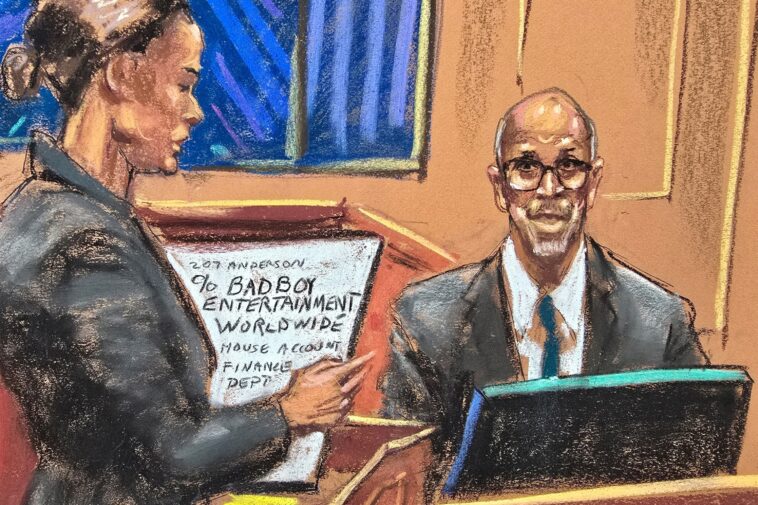The legal proceedings involving popular personality Sean ‘Diddy’ Combs witnessed a significant shift on Wednesday. The U.S. Attorney’s office filed a letter indicating that the prosecutors had scaled back some of the allegations underpinning their racketeering conspiracy argument. The letter revealed that charges pertaining to attempted kidnapping, attempted arson, and abetting sex trafficking, under both California and New York laws, had been removed. The reason for this amendment was that the prosecutors were no longer asserting these liability theories.
Additionally, during a court hearing, it became clear that the prosecutors would no longer present to the jury that obstruction of justice was a component of the suspected conspiracy. This hearing took place a day after testimonies concluded in the federal racketeering and sex trafficking case against the founder of the Sean Jean fashion brand. As a result of this streamline in charge, several fundamental crimes substantiating a racketeering conspiracy were no longer included in the jurors’ instructions.
The prosecutors are anticipated to deliver their closing arguments on Thursday. The case against Sean Combs, which previously encompassed arson, kidnapping, and obstruction of justice as part of the racketeering conspiracy, has now been narrowed down. The charges that remain include drug distribution and sex trafficking claims, as well as forced labor accusations against the rapper.
In order to secure a racketeering conviction, the prosecution must persuade the jury that Combs conspired with his employees, including his security staff, chief of staff, and personal assistants. The allegation is that he manipulated his girlfriends into engaging in prolonged, drug-induced sexual experiences with male sex workers. Combs has pleaded not guilty to all charges against him.
Witness testimonies suggest a history of violent assaults, economic blackmail, and gun threats, allegedly instigated by Combs to support his sexual conduct. Prosecutors have asserted that the Bad Boy Records founder leveraged his extensive business network to sponsor and arrange the logistics for these alleged sexual episodes.
As per the federal indictment, the racketeering conspiracy committed by Combs and his team originally included crimes such as arson, obstruction of justice, sex trafficking, drug possession, forced labor, kidnapping, and moving men for the purpose of prostitution. For the single racketeering charge against Combs to stick, the jury must unanimously agree that he is, in fact, guilty of at least two offenses.
In the latest developments, the prosecutors have clarified to the court that charges of kidnapping, obstruction of justice, and arson are no longer under the jury’s scrutiny. Defense attorney Michael Bachner interprets this move as an attempt to fortify the prosecution’s case. Bachner, who once defended Combs’ bodyguard in a weapons possession trial, indicated that trial strategies often evolve during the process itself.
During the course of the trial, eye-catching testimonies were shared. For example, rapper Kid Cudi (real name Scott Mescudi) testified that his luxury automobile was torched using a Molotov cocktail in 2011, after Combs discovered that Cudi had been dating his ex-partner, pop singer and performer, Casandra Ventura, known as Cassie. Despite an investigation by the Los Angeles Fire Department, no charges were ever filed.
Additional gripping testimonies featured accounts such as that of Capricorn Clark, Combs’ former assistant. Clark depicted a scenario where Combs paid her a visit, gun in hand, and instructed her to accompany him to seek vengeance on Cudi. Clark also claimed that security staff confined her to an office for 40 hours spread over five days, subjecting her to a lie detector test after jewelry loaned to Combs vanished.
Furthermore, it was suggested that Combs proposed a $100,000 payment for a security tape from the InterContinental Hotel in Los Angeles. The tape allegedly displayed Combs physically assaulting his ex-partner Ventura, one of the purported victims of his sex trafficking. However, no police authority was involved in the incident, which could have otherwise been deemed obstruction of justice. Eddy Garcia, a hotel security employee, testified that Combs gave him a substantial cash sum in exchange for a data drive containing the contentious video footage.
The final decision lies in the hands of the jury who, having watched the video as part of the prosecution’s case, must decide on Combs’ guilt. Bachner, while observing the prosecution’s actions, asserts that while there is sufficient evidence to support a racketeering charge, the proof does not necessarily guarantee a conviction.
Bachner noted that when it comes to the trial of celebrities, jurors are often more deliberative in their consideration. He stated that although the elements substantiating the charge are in place, the outcome remains uncertain given the distinct challenges that the prosecution faces.

